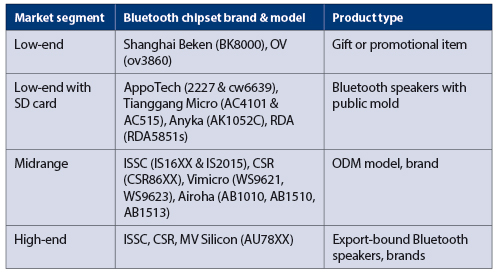Bluetooth chipsets and speaker exteriors are two factors that can be used to estimate product quotes. Higher-priced models adopt top-brand chips and extremely durable, even water-resistant, housings.
When importing portable speakers from China, buyers should not assume that the line's maturity and expansive supplier base means they can simply source from any manufacturer and get top-quality products at budget price.
This article identifies the key parts and components that determine the price and quality of China-made portable speakers.
In a line that is increasingly growing wireless, chipsets naturally rank first in the list of determinants, accounting for as much as 30 percent of speaker price.
Big-brand chips are often adopted in speakers targeting the upper segments of the market. Many of these designs are ODM-based and export-bound. The table below indicates some of the Bluetooth chipset types used in the different portable Bluetooth speakers segments.

The outer shell is another differentiator among portable speakers. Upscale models have ABS or silicone exteriors that are shock- and drop-resistant. HousingsThe outer shell is another differentiator among portable speakers. Upscale models have ABS or silicone exteriors that are shock- and drop-resistant. Housings' capability to withstand moisture is becoming an important factor as well, particularly as suppliers grow their selections of outdoor-use speakers.
Pricing also depends on the type of molds adopted in production. Speakers made using public molds, or molds can be used by any supplier without additional patent or design fees, are priced lower than those formed out of private or ODM molds.
A caveat, though. Speakers made out of public molds should not be the first option for buyers looking for standout top-quality products. The fact that a supplier's speakers are based on molds available to other manufacturers means very similar devices are readily available from other companies.
Batteries account for about 10 to 13 percent of portable speaker price and for this two options are available. Li-ion batteries have a higher energy density and cost less that Li-polymer types. They, however, undergo aging even when not in use.
Li-polymer batteries, on the other hand, are thinner and lighter, making them suitable for Bluetooth speakers with compact or unusually shaped constructions. Li-polymer types are also more powerful than Li-ion packs so they can support new speaker add-ons such as power bank, flashlight and solar charging functions.
At 7 to 14 percent, the speaker driver represents a relatively small share of speaker price although it is a key determinant of sound quality. Aside from supplier-provided specifications, buyers will do well to evaluate speaker drivers based on the following factors:
Magnet: Bluetooth speakers from China normally use neodymium magnets, which have good frequency response. Such types are strong, so speaker drivers require only smaller magnets, allowing suppliers to reduce speaker size and weight further.
Some drivers use ferrite or ceramic magnets, which cost less but crack more easily than neodymium magnets.
Coil: The quality of the coil can be determined by its appearance. High-quality coils are clean, and have no loose or overlapping sections. The inner wall is smooth.
Cone: Normally, the cone is made of rigid, lightweight and highly sensitive paper. Cones used in water-resistant Bluetooth speakers have a coating designed to withstand moisture.
Extras such as NFC, Wi-Fi, and power bank and solar charging capability understandably add to the Bluetooth speaker price. Increments depend on the type and number of features buyers want to incorporate into their orders.
The table below breaks down the aforementioned key price determinants of China-made Bluetooth speakers, their percentage share of product quotes and the share's equivalent in prices.

Aside from the critical parts and components, standards compliance is another factor to consider when calculating portable speaker prices. For instance, CE and RoHS certification are required for Europe-bound models and cost about $800 each, with paperwork guaranteeing RoHS conformance needing to be renewed every year. Securing FCC mark for products meant for the US is about $1,200.
Conformance to Bluetooth Qualification Requirements, a must for all Bluetooth-enabled devices, costs an extra $9,700.